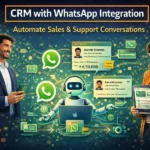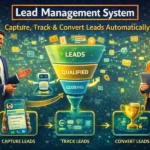AI-Powered CRM Trends 2026: What Indian Companies Need to Know
05 Mar, 2026
India’s sales landscape is changing faster than most businesses realize....
Updated: 13th May, 2025

In today’s competitive market for advertising companies managing huge clients, project deadlines are a hectic task, and having no advanced software makes it for difficult.
Media and advertising agencies often struggle with scattered data, unorganised communication, and the pressure to deliver creative work on time. That’s why CRM software plays an important role in the media and advertising industries.
A CRM designed for creative agencies is more than a contact database—it’s a centralised system that empowers teams to work collaboratively, automate repetitive tasks, track campaigns, and deliver exceptional client service. Let’s explore how a CRM system can bring control, clarity, and efficiency to media and advertising businesses.
In the media industry, maintaining strong relationships is essential. With CRM software:
Agencies can store all client data, including past campaigns, preferences, budgets, and contact history.
● Leads from websites, social media, events, or email campaigns are captured automatically.
● Every client interaction, from Initial query to final execution of campaign it keeps everything in one place.
● This centralisation reduces confusion, helps teams avoid miscommunication, and ensures that no opportunity slips through the cracks.
Time is money in the advertising business. A CRM with a built-in proposal generator helps:
● Create quick, professional-looking campaign quotations and media plans.
● Include campaign goals, timelines, pricing, terms, and branding elements with ready-to-use templates.
● Track proposal status—whether it’s sent, viewed, approved, or under discussion.
● This speeds up client onboarding and gives a professional edge.
Initially, in the campaign, there are multiple steps to finally execute them. CRM Software makes this task easy by breaking a single campaign into tasks as:-
● Break campaigns into smaller tasks assigned to specific team members (e.g., design, copy, ads, approvals).
● Set deadlines, reminders, and dependencies to ensure nothing gets missed.
● Provide a visual pipeline to track progress in real-time.
● This keeps the entire team aligned and ensures that creative output is delivered without last-minute chaos.
Most of the Media and advertising industries make communication with their clients over different communication media like SMS, calls, email and WhatsApp.
With an integrated CRM:-
● All client messages are captured in one thread.
● Automated messages can be sent for campaign updates, approval reminders, or feedback collection.
● WhatsApp Business API, email automation, and SMS plugins ensure quick, efficient communication.
● This improves transparency and keeps clients well-informed.
As the media and advertising industry also receives customer queries, its users also face issues. To handle your customer queries, CRM Software provides a smart and dedicated Ticket Management CRM Software. With this system, clients can raise a ticket about their concerns and can request service.
The system helps in:-
● Internal tagging and team assignment to resolve issues promptly.
● Keep the service history of the customer for better improvement in service quality.
● Quick and transparent handling of issues builds long-term trust.
Understanding the performance of campaigns and internal operations is vital. CRM dashboards help:
● Track lead conversion rates, proposal acceptance, campaign delivery timelines, and more.
● Measure campaign ROI and team performance.
● Make informed decisions for future strategy.
These analytics help optimise efforts and keep campaigns data-driven.
As we know in an industry, there are different departments and everyone has their predefined roles, like an individual department handles finance, some handle creative, campaigns, and the accounts department. CRM Software ensures role-based access.
CRM ensures:
● Each department sees only what it needs using permission controls.
● Collaborative workflow, where tasks move smoothly between departments.
● Reduced internal friction and increased productivity.
● With clearly defined access and responsibilities, accountability becomes easier.
A well-implemented CRM for media and advertising agencies can:
● Speed up client onboarding
● Reduce manual workload
● Ensure campaign delivery on time
● Strengthen communication with clients
● Offer better visibility of the work in progress
● Track the profitability of each campaign
● Boost overall client satisfaction and retention
Manually managing different campaigns for an advertising agency is not an easy task. Without having good CRM software, a team can face many challenges like different emails, WhatsApp groups, spreadsheets and memory-based task tracking. CRM solve all these challenges:-
WhatsApp groups and memory-based task tracking. With CRM:
● Each campaign has a dashboard showing progress and assigned team members.
● Clients get automatic updates when their content is ready for review.
● Account managers can check past feedback before sharing a new proposal.
● Executives can view performance reports at any time.
The result? Faster execution, happier clients, and a more professional image.
Creativity is the heart of every media and advertising agency. But let’s be honest — without some structure, even the best ideas can fall flat.
CRM software helps put that structure in place without slowing down the creative flow.
It keeps your client info organized, tracks follow-ups, manages deadlines, and takes care of the routine stuff — so your team can focus on the work that actually matters.
In an industry where timing is tight and expectations are high, a CRM becomes more than just a tool. It’s like having a silent coordinator making sure nothing slips through the cracks.
If your agency is still juggling spreadsheets and sticky notes, it’s time to switch. A solid CRM isn’t just helpful — it’s a game changer.

05 Mar, 2026
India’s sales landscape is changing faster than most businesses realize....
02 Mar, 2026
Here is a number that should concern every sales leader:...

28 Feb, 2026
Your customers are already on WhatsApp. With over 2 billion...

27 Feb, 2026
Every business runs on leads. But generating leads is only...

24 Feb, 2026
Sales is one of the most human-driven professions in business....